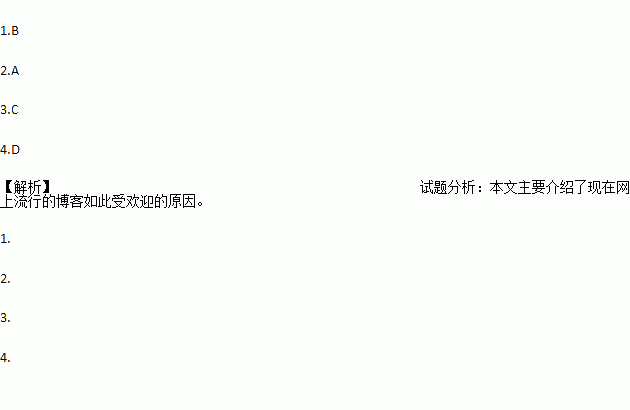题目内容
Have you ever heard of blogs (博客)? If you haven’t, you should have. It’s here, it’s growing and it’s having an influence on our life. Surf the Internet and you’ll find blogs everywhere. A blog, shortened from “weblog”, is a public Internet journal written by one person or a group of people. It is a website in which a person or a group can place news, personal thoughts, text, photos, video or audio files, or links upon which visitors can comment. A blog lets you post on the Internet without having to know web design or be technical. You are given an environment to make dated entries on the topic of your choice which are “published”, so other people can read them.
Authoring a blog, maintaining a blog or adding an article to an existing blog is called “blogging”. Blogging has revolutionized Internet publishing in the last several years because it gives everyone with Internet access the opportunity to become an online writer. Objects, such as “text and photos” in a blog can be called “blog posts”, “posts”, or “entries”. The person who posts these entries is called a “blogger”.
Now, somewhere around the world, a blog is created almost every 6 seconds. Because it’s great potential, Bill Gates views it as important as e-mail, BBS, and MSN. He’s trying to make blogs the important tools for future business communications.
1.A blog is .
A. a comment B. an Internet journal
C. a design D. a link
2.A person can do the following things in a blog EXCEPT _______.
A. talk to others B. give comments
C. read articles D. enjoy photos
3.Who is a blogger?
A. A person who posts letters.
B. A person who writes articles.
C. A person who posts text or photos in a blog.
D. A person who is an online publisher.
4.According to the passage, the reason why blogs are so popular is that they ____.
A. give everyone the chance to be an online writer
B. can be created by people without much knowledge of computer technology
C. enable a blogger to place news, personal thoughts, text and photos and give comments
D. all of the above
 天天向上一本好卷系列答案
天天向上一本好卷系列答案 小学生10分钟应用题系列答案
小学生10分钟应用题系列答案| A. | attempts | B. | requests | C. | doubts | D. | promises |
| A. | used | B. | having used | C. | using | D. | use |


 . At times, I would lose all passion for writing 500 words about an advertisement for a bed for a few pounds, but the terrible smell of paint reminded me to get back to writing.
. At times, I would lose all passion for writing 500 words about an advertisement for a bed for a few pounds, but the terrible smell of paint reminded me to get back to writing.